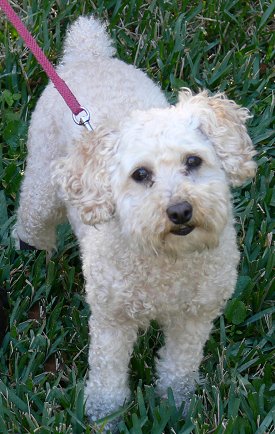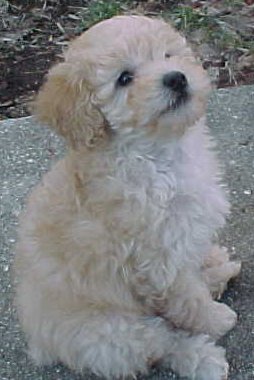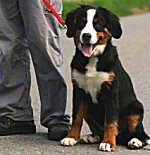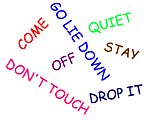Miniature Poodles: What's Good About 'Em, What's Bad About 'Em
Miniature Poodle temperament, personality, training, behavior, pros and cons, advice, and information, by Michele Welton, Dog Trainer, Behavioral Consultant, Author of 15 Dog Books

Buffy (The Vampire Slayer), one of the smartest dogs I've ever had, and a spectacular athlete in the sport of agility
Many people have misconceptions about Poodles – that they are "sissy" dogs.
That is one of the biggest myths in dogdom.
First, ignore the silly show-ring clips. Poodles can be clipped to look like normal dogs. Look at the Miniature Poodle in the photo. That's my girl, Buffy. It takes me 30 minutes every six weeks to bathe her and run over her coat with a handheld clipper (#5 blade), turning her into a shorthaired, normal-looking dog.
Second, Miniature Poodles are miniature athletes. They excel in advanced obedience competition, where retrieving and jumping skills are required. They excel in agility (obstacle course) competition, where they dash over and under and through the obstacles with a strength and grace that is breathtaking to watch.
But....this breed does come in two different builds. The correct build is "square", which means their legs are long enough that their height is approximately equal to their length. Buffy has this build. These Miniature Poodles are both elegant and athletic, moving with a light, springy gait.
Other Miniature Poodles are built lower to the ground, with short legs and a long back. These dogs have inherited a physical deformity called chondrodysplasia. It means they don't have the same elegance or agility as a properly square Miniature Poodle. Worse still, it means they're more susceptible to disk disease (though square poodles can develop this disease, too).
But whatever the build, a good Miniature Poodle is one of the smartest and most trainable of all breeds. This is a "thinking" dog who pays rapt attention to you, learns quickly, and responds well to training.
Indeed, Miniature Poodles NEED some sort of mental stimulation in order to be happy, even if it's just challenging games such as hide 'n seek, or fetching a variety of named toys. This intelligent breed should never be relegated to the backyard and ignored.

Buffy (the Vampire Slayer) the day we brought her home at 7 weeks.
Most Miniature Poodles make great watchdogs, which simply means they will bark when they hear someone at the door. Most individuals tend to be reserved (though polite and non-aggressive) with strangers. But there are also individuals – like my dog Buffy – "who never met a stranger." In other words, she considers everyone she meets to be her new best friend!
Honestly, if everyone in our world acted like Buffy, we would all be living in harmony.
With other dogs and cats, Miniature Poodles are peaceful and accepting.
Poodles also have the advantage of being the lightest-shedding, most hypoallergenic of all coated breeds. (Hairless breeds have no hair at all to shed.)
So do Miniature Poodles sound like a dream dog? Well, no breed is perfect!
Besides the frequent clipping, Poodles do need daily exercise and playtime, as they're typically lively dogs.
And Poodles need a great deal of companionship throughout the day. This makes them a great choice for shut-ins or people who work from home. But if everyone is gone for many hours, a Poodle will be unhappy. They're dependent dogs, and if they get lonely, they may bark, or chew destructively.
Poodles are also "pattern-oriented" dogs who prefer their routines to always be the same. They can get flustered and anxious if you change things too much.
Poodles are soft-tempered, sensitive dogs, sometimes hypersensitive. If you touch them unexpectedly or startle them with a sudden loud sound, they tend to flinch. The most sensitive individuals are unhappy around small children.
Similarly, Miniature Poodles can get emotionally upset if there's too much activity or conflict or roughhousing in your household. These gentle dogs prefer peace and harmony.
You do have to watch your lines.... some Miniature Poodle lines are high-strung and nervous, and this is where you'll find those neurotic Poodles that people scoff about. But how a Poodle turns out also depends on socialization and training. When taken out to experience the world and treated like an intelligent and capable dog, a Miniature Poodle is likely to live up to those expectations.
If you want a dog who...
- Is conveniently-sized – neither too small or too large
- Is graceful, yet also athletic
- Has a short curly coat that is virtually non-shedding (the best coated breed for allergy sufferers)
- Comes in a variety of colors
- Is lively and playful
- Is one of the brightest and most attentive of all breeds
- Is easy to train and housebreak
- Is usually polite with strangers and sociable with other animals
A Miniature Poodle may be right for you.
If you don't want to deal with...
- Clipping the curly coat every six weeks, without fail
- A careful search to avoid high-strung, neurotic lines
- Timidity when not socialized enough
- Emotional sensitivity to stress, tension, and loud voices
- Potential barking
A Miniature Poodle may not be right for you.
 |
Dog Breed Traits – Which Traits Are Right For You? In this brand new series, I'll help you decide which dog breed traits would best suit you and your family, your home and yard, and your lifestyle, so you can choose the best dog breed for your family. |
Keep in mind that the inheritance of temperament is less predictable than the inheritance of physical traits such as size or shedding. Temperament and behavior are also shaped by raising and training.
FREE eBooks by Michele Welton
![]() "Respect Training for Puppies" and "Teach Your Dog 100 English Words" are free step by step guides to teaching your pup to be calm and well-behaved.
"Respect Training for Puppies" and "Teach Your Dog 100 English Words" are free step by step guides to teaching your pup to be calm and well-behaved.
![]() "11 Things You Must Do Right To Keep Your Dog Healthy and Happy" is a free guide to keeping your dog mentally, physically, and emotionally happy and healthy so you can enjoy a longer lifetime of companionship.
"11 Things You Must Do Right To Keep Your Dog Healthy and Happy" is a free guide to keeping your dog mentally, physically, and emotionally happy and healthy so you can enjoy a longer lifetime of companionship.

- You can avoid some negative traits by choosing an ADULT dog from an animal shelter or rescue group. With an adult dog, you can easily see what you're getting, and plenty of adult Mini Poodles have already proven themselves not to have negative characteristics.
- If you want a puppy, you can avoid some negative traits by choosing the right breeder and the right puppy.
More traits and characteristics of the Miniature Poodle
If I was considering a Miniature Poodle, I would be most concerned about...
- Avoiding neurotic temperaments. Whenever a breed is common, many people breed them just to make some money, without having enough knowledge of how to produce healthy, stable dogs. As a result, obedience instructors and behavioral consultants, like myself, see lots of Mini Poodles with neurotic behaviors, including hyperactivity, senseless barking, and hyperactivity. Obviously you want to avoid these dogs!
- Grooming. A lot of people are attracted to Poodles because they're so light-shedding and hypoallergenic. But light shedding always comes with a trade-off.
In the Poodle's case, it's the amount of clipping they require. To keep their curly coat short and free of mats, Miniature Poodles require clipping every 4 to 6 weeks. Without fail.
Professional groomers will try to sculpture your poodle with a shaved face, a topknot on his head, and a pom pom on his tail. That's the frou-frou look that keeps so many people from choosing a poodle. Now, if you like that look, fine.
But if you don't like it, take control of how the groomer clips your dog. Or learn how to do it yourself – it's really easy. See photos of my girl Buffy, at the top of the page, and just below this paragraph. Short coat, whiskery face, short ears, nothing shaved, no topknot or pompoms. Many people are surprised to find out that she's a Poodle. "She looks like a normal dog," they say. Works for me!

- Emotional sensitivity. Be honest... is there tension in your home? Are people loud or emotional? Miniature Poodles are extremely sensitive to stress. They can end up literally sick to their stomachs, with digestive upsets and neurotic behaviors, if the people in their home are having family problems. Miniature Poodles are peaceful, sensitive dogs who need a peaceful, harmonious home.
- Providing enough socialization. Some Mini Poodles are quite friendly, but most are a little standoffish with strangers. To avoid timidity or suspiciousness, it's important to take your dog out into the world as a young puppy and indeed all through his life.
- Barking. Poodles are very observant. Even Poodles who love everyone will bark when they see or hear something unusual. In fact, they're often too quick to sound the alarm at every new sight and sound. You have to be equally quick to stop them. You can only do that if you have the right relationship with your dog, where you are the leader and he is the follower. In other words, your Miniature Poodle must respect you. Fortunately this is very easy to do with Poodles. Follow my free online training programs.
- Health problems. Miniature Poodles can live to 15 or 16 years old, but they're not always healthy during all those years. Chronic problems in Poodles include allergies, heart and bronchial diseases, joint disorders, and eye diseases. Read more about Miniature Poodle Health.
My best-selling books – now available FREE on my website
 Respect Training For Puppies: 30 seconds to a calm, polite, well-behaved puppy is for puppies 2 to 18 months old. Your puppy will learn the 21 skills that all family dogs need to know. Click here to read for free.
Respect Training For Puppies: 30 seconds to a calm, polite, well-behaved puppy is for puppies 2 to 18 months old. Your puppy will learn the 21 skills that all family dogs need to know. Click here to read for free. Teach Your Dog 100 English Words is a unique Vocabulary and Respect Training Program that will teach your adult dog to listen to you and do what you say. Click here to read for free.
Teach Your Dog 100 English Words is a unique Vocabulary and Respect Training Program that will teach your adult dog to listen to you and do what you say. Click here to read for free. 11 Things You Must Do Right To Keep Your Dog Healthy and Happy helps your dog live a longer, healthier life. Get my honest advice about all 11 Things before you bring home your new puppy, because some mistakes with early health care cannot be undone. Click here to read for free.
11 Things You Must Do Right To Keep Your Dog Healthy and Happy helps your dog live a longer, healthier life. Get my honest advice about all 11 Things before you bring home your new puppy, because some mistakes with early health care cannot be undone. Click here to read for free.Related posts you might enjoy






